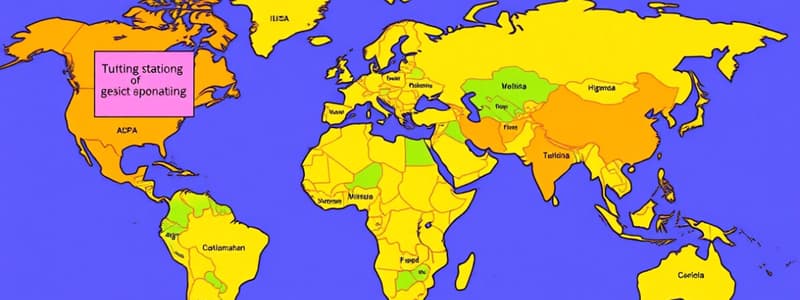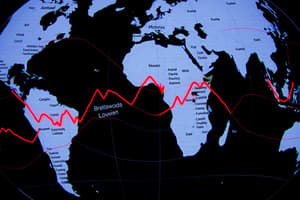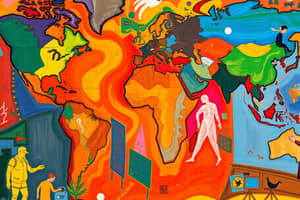Podcast
Questions and Answers
Every increase in world trade is an opportunity to:
Every increase in world trade is an opportunity to:
increase the division of knowledge.
A producer has an absolute advantage in the production of a good if:
A producer has an absolute advantage in the production of a good if:
it uses fewer resources than other producers.
Globalization:
Globalization:
has been a theme in human history since the Roman Empire.
_________ was the first item ever sold on eBay?
_________ was the first item ever sold on eBay?
The total amount of knowledge in a society that has no trade or specialization is largely limited by:
The total amount of knowledge in a society that has no trade or specialization is largely limited by:
Average wages in the textbook's trade model can be calculated by:
Average wages in the textbook's trade model can be calculated by:
As trade changes demand, workers in sectors with falling wages will move to sectors with rising wages until:
As trade changes demand, workers in sectors with falling wages will move to sectors with rising wages until:
When might mutually beneficial trades be difficult to find?
When might mutually beneficial trades be difficult to find?
Oliver sells a guitar to Tobey and both men feel that they benefitted from the transaction because:
Oliver sells a guitar to Tobey and both men feel that they benefitted from the transaction because:
People will only bother to specialize if they feel confident that they can:
People will only bother to specialize if they feel confident that they can:
If Kyle voluntarily sells a guitar to Tona for $800, it must be that:
If Kyle voluntarily sells a guitar to Tona for $800, it must be that:
Most of us can earn in one day of confirmed work enough money to purchase more food than we could possibly grow ourselves in a year. One important reason for this is that farmers:
Most of us can earn in one day of confirmed work enough money to purchase more food than we could possibly grow ourselves in a year. One important reason for this is that farmers:
When two nations with different comparative advantages trade, they both benefit. This is due to:
When two nations with different comparative advantages trade, they both benefit. This is due to:
If 100 people in society J all know the same 10 facts, but 100 people in society K specialize, what is true?
If 100 people in society J all know the same 10 facts, but 100 people in society K specialize, what is true?
Suppose that in Mexico it takes four labor hours to produce one shirt and 10 labor hours for one computer. What values of x will give Mexico the absolute advantage in the production of shirts?
Suppose that in Mexico it takes four labor hours to produce one shirt and 10 labor hours for one computer. What values of x will give Mexico the absolute advantage in the production of shirts?
Suppose the 100 people in society J all know the same 10 facts, but the 100 people in society K specialize. What is true?
Suppose the 100 people in society J all know the same 10 facts, but the 100 people in society K specialize. What is true?
If 100 people in society C all know the same 10 facts, but 10 people in society D specialize, how many times better is the standard of living in society D?
If 100 people in society C all know the same 10 facts, but 10 people in society D specialize, how many times better is the standard of living in society D?
A change in which of the following would result in a change in a country's PFF?
A change in which of the following would result in a change in a country's PFF?
Farmers in New Zealand wake at 5 AM to work hard in their fields growing kiwi because:
Farmers in New Zealand wake at 5 AM to work hard in their fields growing kiwi because:
In terms of shirts, what is the opportunity cost of a computer produced in Mexico?
In terms of shirts, what is the opportunity cost of a computer produced in Mexico?
What happens to value when a good is transferred from a person who does not value it very much to someone who values it a lot?
What happens to value when a good is transferred from a person who does not value it very much to someone who values it a lot?
Suppose that in Mexico it takes four labor hours to produce one shirt and 10 labor hours to produce one computer. What values of x will give Mexico the comparative advantage in the production of shirts?
Suppose that in Mexico it takes four labor hours to produce one shirt and 10 labor hours to produce one computer. What values of x will give Mexico the comparative advantage in the production of shirts?
If both countries have 60 labor hours available, completely specialize according to comparative advantage, and trade 7.5 shirts for 7.5 computers, how much higher are average real wages in the United States after trade?
If both countries have 60 labor hours available, completely specialize according to comparative advantage, and trade 7.5 shirts for 7.5 computers, how much higher are average real wages in the United States after trade?
Flashcards are hidden until you start studying
Study Notes
Trade and Specialization
- Every increase in world trade enhances the division of knowledge, allowing societies to expand their understanding collectively.
- A producer has an absolute advantage if it uses fewer resources than competitors in the production of a good.
- Globalization has been a continuous factor throughout human history, dating back to the Roman Empire.
Knowledge and Resources
- In societies without trade or specialization, the breadth of knowledge is constrained by individual cognitive capacity.
- Average wages in trade models are derived from the total consumption value in a nation divided by its population.
- Workers migrate from sectors facing declining wages to those with rising wages, leading to wage equalization across sectors.
Value Creation and Trade Benefits
- Mutually beneficial trades become challenging if two individuals share identical preferences.
- Successful transactions, like Oliver selling a guitar to Tobey, indicate differing value perceptions between participants.
- Specialization is motivated by the confidence that individuals can trade for goods they opt not to produce.
Opportunity Costs and Comparative Advantages
- If Kyle sells a guitar to Tona for $800, it signifies that Tona values the guitar more than Kyle does.
- Large-scale farming allows farmers to acquire equipment and produce more, enabling them to sell surplus food for greater profit.
- Nations gain from trade when differences in comparative advantages are evident, enhancing mutual benefits.
Aggregated Knowledge
- Societies lacking specialization have lower aggregate knowledge compared to those with unique expertise among individuals.
- For example, society K with specialization displays a higher total knowledge pool than society J despite individual knowledge levels being equal.
Productivity Frontiers and Economic Increment
- A change in a country’s production possibilities frontier (PFF) occurs with shifts in input supply or productivity.
- Farmers in New Zealand prioritize kiwi cultivation knowing the reward outweighs the cost of their time and resources.
Opportunity Cost Calculations
- Example: In Mexico, producing a computer costs 3 shirts in terms of opportunity cost.
- The comparative advantage for shirts in Mexico occurs with values of x (time to produce a computer) less than 7.5 hours.
Economic Impact of Trade
- Value increases when goods transfer to individuals who place higher value on them, enhancing overall welfare.
- After trade, average real wages in the U.S. can increase by $4.17 if specialization and advantageous trading are implemented, compared to no-trade scenarios.
Studying That Suits You
Use AI to generate personalized quizzes and flashcards to suit your learning preferences.




